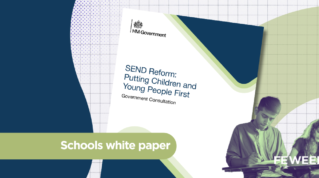If someone was ever asked to describe me the words would be a bit quirky, weird or strange. Throughout my childhood and adulthood, it always seemed that no matter how hard I tried to fit in I never quite managed it. It was only until I started teaching psychology in an FE college this year that I started to understand neurodivergence and where I fit into that.
Working in the FE sector, I have been able to explore my neurodiverse background safely. Previously I went undiagnosed in fear of being discriminated against and occasionally was accused of being autistic as an insult. And while I have had issues in communication and misinterpretation generally it’s been one of the safest environments I have worked in. The idea of autism being a diffability rather than a disability is communicated through the CPD days to the openness of management.
There are several challenges I face as a neurodivergent teacher such as masking, social interactions and staff culture. Early on I felt like I needed to ‘mask’ and do a performance of what a teacher should be, such as always smiling, and energetic. Masking is a term often used in autism and even though the workplace is a theatre for most people for me it’s the inherent desire to try to appear normal. In trying to embody a ‘normal’ person I pay attention to every little detail to try to fit to expectations. I think about every sentence, every change of tone trying to decipher what it really means. However this was exhausting, and my weekends were often spent recovering from the week. Since then, I have been leaning into a more natural style and built relationships with colleagues who understand me which has helped with navigating the unspoken social rules of the staffroom.
Another challenge is following rules to the exact letter which sounds great on paper until you realise there are nuanced unwritten rules, especially in the workplace and then you realise that you don’t have the rulebook. I have also noticed that people don’t appreciate it when you tell them the truth, preferring the accepted social norms. People say one thing and then mean another; the spoken word is often a mask for the actual meaning, and I am taking every word literally.
In terms of supporting neurodivergent students, I understand the landscape they navigate through, having lived experience myself which means I can anticipate the situations in where they struggle such as transitions or feeling misunderstood. I also recognise the strengths of neurodivergence such as pattern recognition, deep focus and the different ways of thinking and encourage these as strengths and not obstacles to overcome.
How does this impact teaching? In terms of subject knowledge, I have to say I am pretty good, the hyperfocus has a place to go. Classroom management is something I have developed, having pattern recognition skills works to my advantage and I have learnt that predictability is key. It also gives me the added advantage in understanding that not everyone thrives in the same mode, so I give options into how much they want to participate in class. However, for someone who thrives in silence the constant chaos can be too much at times. In trying to create an inclusive environment for my students I sometimes find it hard to create one for myself. However, building quiet moments in the day to recharge has helped me.
When discussing inclusivity and neurodivergence, the college always makes it clear it’s for students and staff on the spectrum, and it is celebrated through training and storytelling. This is what an inclusive environment does and one that I hope my neurodivergent students will experience when they go out into the world of work. Autism is not a disability but rather a different way to view the world, and difference is something to celebrate.
The only tip for other neurodivergent teachers is to find an environment that suits you and lean into your strengths. Remember, you bring a needed perspective to a diverse community.
















Your thoughts